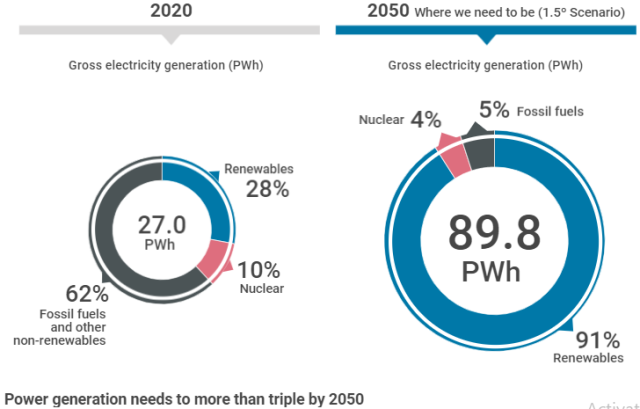The global energy transition is not progressing as intended and is being exacerbated by the impact of global crises. During the Berlin Energy Transition Dialogue (BETD), IRENA’s Director-General Francesco La Camera presented the World Energy Transitions Outlook 2023 Preview, demanding a significant course correction in the energy transition.
To achieve a successful energy transition, comprehensive policies and investments across all sectors and the world are necessary to promote the growth of renewables and the structural changes needed for a predominantly renewables-based energy transition.
Progress is falling short of the 1.5°C pathway. The power sector has made significant progress, with renewables accounting for 40 percent of installed power generation globally and contributing to an 83 percent of global power additions in 2022. Deployment levels must increase to over 10,000 GW in 2030 from some 3,000 gigawatt (GW) today to keep the 1.5°C target achievable.
The Preview highlights that deployment is limited to certain regions, with China, the European Union, and the United States accounting for two-thirds of all additions last year, leaving developing nations further behind.
IRENA’s Preview outlines three priority pillars for the energy transition, including physical infrastructure, policy and regulatory enablers, and a well-skilled workforce, requiring significant investment and new forms of cooperation in which all actors can play an optimal role.
The Preview warns that a lack of progress increases investment needs and calls for a systematic change in the volume and type of investments to prioritize the energy transition. Though global investment in energy transition technologies reached a new record of USD 1.3 trillion in 2022, yearly investments must more than quadruple to over USD 5 trillion to stay on the 1.5°C pathway. By 2030, cumulative investments must amount to USD 44 trillion, with transition technologies representing 80 percent of the total.
The Preview also emphasizes that any new investment decisions should be carefully assessed to drive the transition and reduce the risk of stranded assets. Around USD 1 trillion of planned annual fossil fuel investment by 2030 must be redirected towards transition technologies and infrastructure to keep the 1.5°C target within reach. Public sector intervention is also required to channel investments towards countries in a more equitable way.
IRENA’s Director-General stresses the need for a fundamental shift in the support to developing nations, focusing more on energy access and climate adaptation. Moving forward, multilateral financial institutions need to direct more funds, at better terms, towards energy transition projects and build the physical infrastructure needed to sustain the development of a new energy system.
Some 41 per cent of planned investment by 2050 remains targeted at fossil fuels. Around USD 1 trillion of planned annual fossil fuel investment by 2030 must be redirected towards transition technologies and infrastructure to keep the 1.5°C target within reach.
In 2022, 85 percent of global renewable energy investment benefitted less than 50 percent of the world’s population. Africa accounted for only one percent of additional capacity in 2022.

